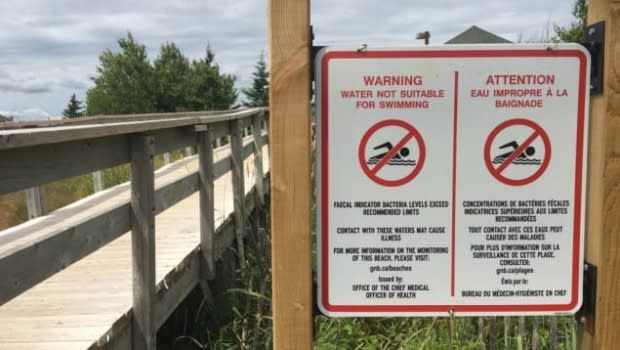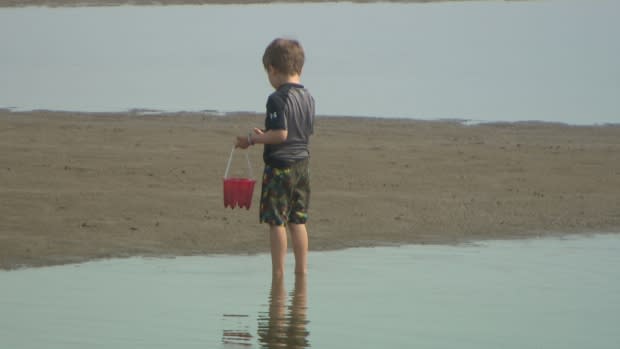Internal documents give window into work done to get Parlee Beach Blue Flag designation
It was a quick turnaround for Parlee Beach to receive an international award for cleanliness so soon after its water quality struggles, but internal documents reveal some of what went on behind the scenes to make that happen.
The news came last month that New Brunswick's most popular beach had been awarded a Blue Flag designation — joining beaches around the world that meet "stringent environmental criteria," according to the international organization's own website.
"It's a big day for Parlee Beach," provincial Tourism Minister Robert Gauvin said.
But emails obtained by residents through right to information requests and shared with CBC News give a window into how the province and Blue Flag worked hand-in-hand to make it happen, including removing some rainy days from consideration.
The province tried to qualify for the designation after the 2017 summer but was advised it likely wouldn't make the cut.
It came close to not making it either after the 2018 season.

"While the trend is good, we have a few concerns," Kelsey Scarfone, water program manager with Environmental Defence, which runs the Blue Flag program in Canada, wrote in an email to the Department of Tourism on Nov. 13.
"The number of postings is borderline with our criteria and the data specific to only the bathing season is slightly under at 78 per cent between June 1 - Sept. 1."
The number of postings is borderline. - Blue Flag Canada
"Can we set up a phone call for next week to discuss?"
Blue Flag requires the water be clean at least 80 per cent of the time. That's four days out of five.
There are no more emails on that subject. The application to Blue Flag was signed on Jan. 11, 2019. In May, the province announced Parlee scored the Blue Flag with an 88 per cent compliance rate.
Rainfall discounted
Blue Flag confirmed to CBC it arrived at that score by removing days where a no-swimming advisory was issued last summer because of heavy rainfall.
Eleven days had advisories because of high levels of fecal bacteria alone in those peak summer months, and it's based on that statistic that Parlee scored the Blue Flag.
Coincidentally, last week, Dr. Jennifer Russell, the province's chief medical officer of health, announced the beach would no longer be under an automatic no-swim advisory because of heavy rainfall, as had been the case since the province adopted the guidelines for Canadian recreational water quality.

The Canadian guidelines list rainfall, along with fecal contamination, toxic cyanobacteria and swimmer's itch, as the four reasons a province's public health body may consider issuing a no-swimming advisory.
Rainfall is included because it can cause organic matter from farms or sewage overflows to run off into the ocean, increasing the bacteria levels.
Russell said rainfall had not proven a reliable predictor of water quality, and therefore the province was discontinuing those types of advisories.
Positive messaging
The documents also show Blue Flag helped the province with its positive messaging around Parlee Beach.
After a CBC report on a particularly high level of bacteria in a daily sample in June 2018, the organization advised the province to focus heavily on the "percentage of the season" messaging, noting the water at Parlee had been clean roughly 90 percent of the time.
"These are the numbers to really push with the public and the numbers I'll be focusing on if I do any media on the subject," Blue Flag's Scarfone wrote in an email.
"I would ask your media consultant to respond to the latest article and ask that it include those percentage numbers for the seasons on the whole.
"We'll turn the dial slowly but surely."

Parlee Beach is one of New Brunswick's major tourist draws, and before the water-quality controversy would attract up to 350,000 visitors a year, generating more than $4 million in revenue.
That number has been shrinking for two consecutive summers now.
"A Blue Flag certification could result in increased consumer confidence and increased revenue, not only for the park and its concession operations but Shediac's business community," a senior project executive with the Department of Tourism wrote in a briefing note to the minister on Oct. 22.
At that time, the data from the summer of 2018 was already making tourism officials nervous.
"There is a risk that the 2018 water quality results at Parlee Beach will not meet with Blue Flag Canada criteria, which will delay certification beyond 2019," the note said. "The perception of this could further decrease consumer confidence and revenue."
Another briefing note mentioned the province was under pressure from the mayors of Shediac, Cap-Pelé and Beaubassin East, who had been asking to take steps toward obtaining a Blue Flag designation for Parlee Beach.
The documents also reveal the Tourism Department pursued the idea of having someone from the province appointed to the national Blue Flag jury, which evaluates applicants and decides which to forward to the international jury.
The name of Dr. Christine Muecke, deputy chief medical officer of health, was mentioned in emails, but a provincial official advised to go with someone from a non-governmental organization, to "ensure that government is not perceived as influencing the committee."
In the end there was no New Brunswick representative on the jury that decided to approve Parlee's application.


